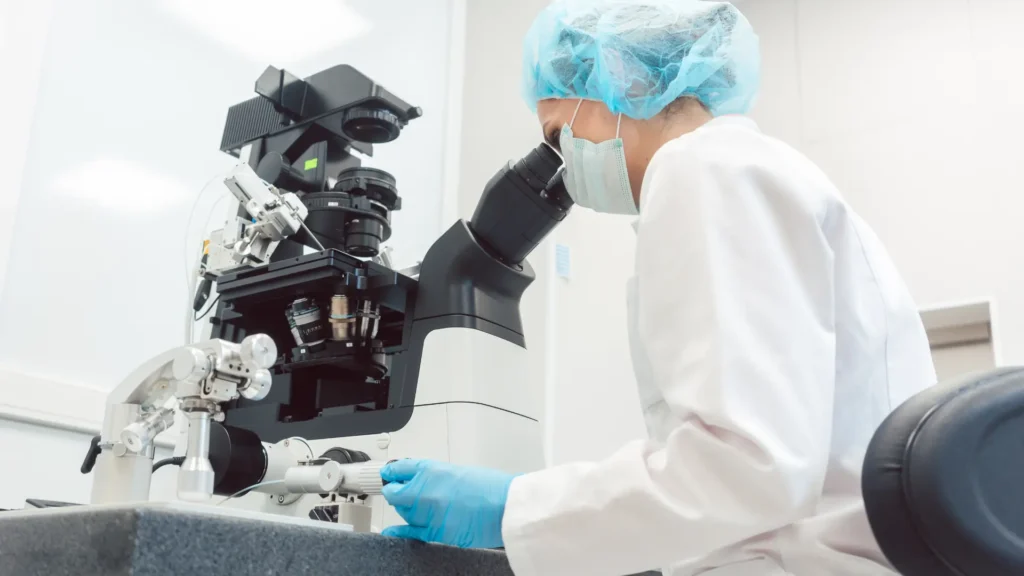For many couples facing challenges on their path to parenthood, the term IVF represents a beacon of hope. Yet, In Vitro Fertilisation can also sound like a complex, clinical, and sometimes intimidating process. Understanding what the journey truly involves, step by step, can transform anxiety into confidence and make the process feel much more manageable.
My name is Dr. Vrushali Pillai, and as a Senior Consultant Obstetrician & Gynaecologist at Borneo Hospital, Thane – part of the Borneo Hospitals group with dedicated fertility services across Thane, Nashik, Chhatrapati Sambhaji Nagar, and Raipur City – I have had the privilege of guiding countless couples through their IVF treatment. Our commitment is to provide not only advanced medical care but also clear, compassionate guidance to demystify this remarkable journey.
This article aims to walk you through the IVF process as we manage it at Borneo Hospital, breaking it down into a clear, step-by-step guide. Our goal is to help you feel fully informed and empowered as you take this positive step towards building your family.
The Foundation of Every IVF Journey
It’s important to understand that an IVF cycle is not the first step. It is a sophisticated treatment recommended after a thorough fertility evaluation of both partners has been completed. This initial diagnostic phase helps us understand the underlying cause(s) of infertility.
Based on these findings, our fertility specialists create a personalised treatment plan. IVF is recommended when it is considered the most appropriate and effective option for your specific medical situation. Every couple’s journey is unique.
The IVF Process Step-by-Step at Borneo Hospital
An IVF cycle is a carefully orchestrated series of procedures. Here is a guide to the key stages:
Step 1: Ovarian Stimulation (Growing the Eggs)
The Goal:
In a natural menstrual cycle, a woman typically develops and releases just one mature egg. The goal of this first step of IVF is to use hormonal medications to gently stimulate the ovaries to produce multiple mature eggs in a single cycle. Having more eggs available increases the chances of creating several healthy embryos, which enhances the overall chance of success.
The Process:
This phase involves a course of hormonal injections (called Gonadotropins, containing hormones like FSH and LH) which you will take daily for approximately 8 to 14 days. We know the idea of injections can be daunting, but please be reassured. Our supportive nursing team at Borneo Hospital provides thorough, easy-to-follow instructions on how to self-administer these simple injections at home, making the process comfortable and manageable.
The Importance of Monitoring:
This is a highly controlled and monitored phase. You will need to visit the hospital every few days for transvaginal ultrasound scans and sometimes blood tests. These frequent checks allow us to watch the follicles (the small fluid-filled sacs in the ovaries where the eggs grow) develop, measure their size, and monitor your hormone levels. This regular monitoring is crucial for us to adjust your medication dosage for an optimal response and to ensure your safety.
Step 2: Egg Retrieval (The Collection Procedure)
The Goal:
To collect the mature eggs from the follicles in your ovaries at the perfect moment of readiness.
The “Trigger Shot”:
Once your ultrasound scans show that the follicles have reached the ideal size, you will take a final hormone injection. This ‘trigger shot’ (often hCG) helps the eggs complete their final maturation process. The egg retrieval procedure is timed precisely, usually about 34 to 36 hours after this injection. The timing are critical.
The Procedure:
Egg retrieval is a short, minor surgical procedure performed as a day case at Borneo Hospital. To ensure you are completely comfortable and feel no pain, it is done under light sedation or a short-acting general anaesthetic. The procedure itself is minimally invasive. Using transvaginal ultrasound for guidance, your doctor will pass a thin needle through the vaginal wall and into each ovarian follicle to gently aspirate (draw out) the fluid, which contains the mature egg. The entire procedure typically takes only about 20-30 minutes, after which you will rest in our recovery area for a few hours before going home.

Step 3: Fertilisation & Embryo Culture (In the IVF Laboratory)
1. The Goal:
To fertilise the collected eggs with sperm and allow the resulting embryos to grow and develop in a highly controlled, nurturing environment.
2. Sperm Collection:
On the same day as your egg retrieval, your partner will provide a fresh semen sample. Our andrology lab then processes this sample, washing and preparing it to select the healthiest, most motile sperm for fertilisation.
3. The Fertilisation Methods:
- Conventional IVF: The retrieved eggs and the prepared sperm are placed together in a special culture dish in our laboratory. Fertilisation is then allowed to occur naturally overnight as the sperm swim to and penetrate the eggs.
- ICSI (Intracytoplasmic Sperm Injection): This advanced technique is a powerful tool, particularly for cases involving male factor infertility (such as very low sperm count, poor motility, or abnormal shape). In ICSI, our highly skilled embryologist uses a high-powered microscope and sophisticated micromanipulation tools to select a single healthy sperm and carefully inject it directly into the centre of each mature egg. Borneo Hospital has the advanced capability to perform ICSI when it offers the best chance of fertilisation.
- Embryo Development: The fertilised eggs, now officially called embryos, are placed in special incubators that maintain the precise temperature, atmosphere, and humidity needed for healthy development, mimicking the conditions of the womb. Our expert embryologists carefully monitor the embryos over the next 3 to 5 days, watching them divide and grow. The aim is often to culture them to the ‘blastocyst’ stage (a more advanced embryo stage reached around Day 5), as blastocysts often have a higher potential for successful implantation.
Step 4: Embryo Transfer (The Big Day)
The Goal:
To gently place one or two of the best-quality embryos into your uterus, where it will hopefully implant and grow into a successful pregnancy.
The Procedure:
The embryo transfer is a simple and usually painless procedure that feels quite similar to a smear test or an IUI. It does not require any anaesthesia. The selected embryo(s) are loaded into a very thin, soft catheter. Your doctor then carefully passes this catheter through your cervix and into your uterus, often under ultrasound guidance to ensure precise placement. The embryo(s) are then gently deposited into the uterine cavity.
Deciding How Many Embryos:
The decision on the number of embryos to transfer (usually one or two) is a very important one, made in careful consultation between you and your doctor. Factors like your age, the quality of the embryos, your past fertility history, and the desire to minimise the risks of a high-order multiple pregnancy (triplets or more) are all taken into account to create a personalised plan that maximises your chance of a healthy singleton pregnancy.
Step 5: The Luteal Phase & The “Two-Week Wait”
Hormonal Support:
After the embryo transfer, you will be prescribed progesterone medication. This can be in the form of injections, vaginal gels, or pessaries. Progesterone helps to support the uterine lining (endometrium), making it more receptive for the embryo to implant and grow.
The “Two-Week Wait”:
This period, between the embryo transfer and your official pregnancy test, is often the most emotionally challenging part of the entire IVF process. It’s a time filled with hope and anxiety. We advise you to engage in gentle daily activities, avoid strenuous exercise or heavy lifting, and focus on stress management and self-care.
The Pregnancy Test:
To get an accurate result, we will schedule a blood test (to measure the pregnancy hormone Beta-hCG) at Borneo Hospital around 12-14 days after your embryo transfer.

What Happens to Extra Embryos? (Understanding Freezing/Vitrification)
It is common to have more than one good-quality embryo develop in an IVF cycle. Any high-quality embryos that are not transferred during your fresh cycle can be frozen using an advanced ultra-rapid freezing technique called vitrification. These frozen embryos can then be used in a future Frozen Embryo Transfer (FET) cycle, giving you another chance for pregnancy without needing to go through the ovarian stimulation and egg retrieval process again.
The Borneo Hospital Difference: Our Approach to Your IVF Journey
- Personalised Protocols: We firmly believe there is no one-size-fits-all approach to IVF. Your stimulation protocol, medication dosages, and overall treatment plan are customised based on your unique medical profile.
- Expert, Collaborative Team: Your care is managed by our experienced team of obstetricians and gynaecologists like myself, skilled embryologists who expertly care for your precious embryos, and compassionate, supportive nursing staff who guide you at every stage.
- State-of-the-Art IVF Laboratory: The quality of the IVF laboratory is absolutely critical for success. Borneo Hospital has invested in advanced incubators, air purification systems, and the latest technology to provide the optimal environment for your embryos to thrive.
- Transparent Communication & Counselling: We are committed to clear and honest communication throughout your journey. We ensure you understand each step, your results, and your options. We also recognise the emotional toll and provide access to counselling and support.
- Integrated Care for Success: As a comprehensive mother and child hospital founded by a leading paediatrician, Dr. Santosh Madrewar, our care extends beyond conception. We offer a seamless transition to our expert antenatal services to manage your precious pregnancy right through to delivery and beyond.
Understanding the step-by-step process of an IVF cycle – from Stimulation and Retrieval to Fertilisation and Transfer – can help to demystify the journey and make it feel far less intimidating. It is a remarkable process that blends advanced science with deep hope and requires a strong, trusting partnership between you, your partner, and your dedicated medical team.
The journey through IVF is one of patience, resilience, and optimism. At Borneo Hospital, our entire team across all our branches is committed to supporting you with expert, compassionate, and personalised fertility care, giving you the best possible chance to build your family.



